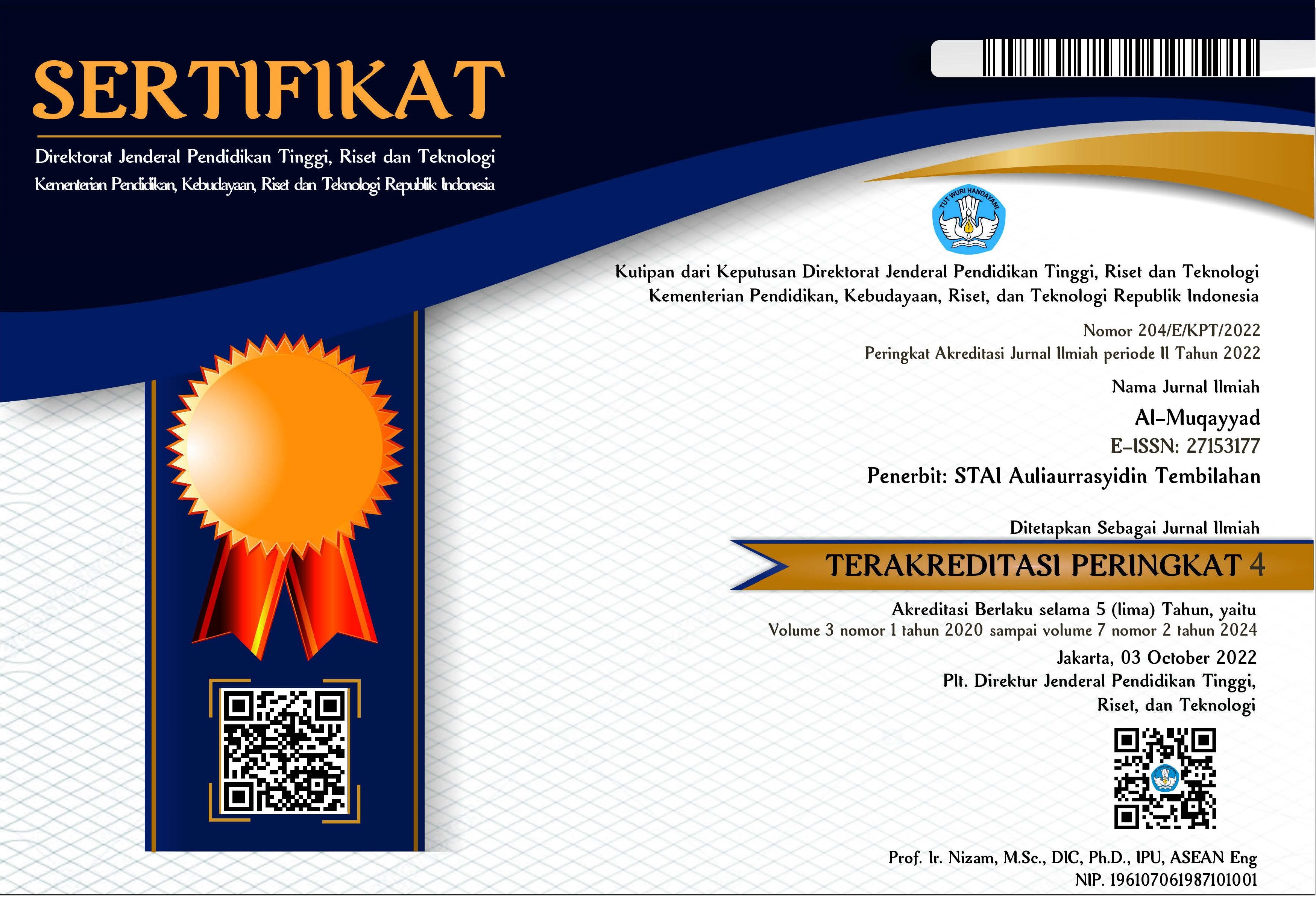Faktor Berkah dalam Pola Konsumsi dan Tingkat Kepuasan untuk Pemenuhan Kebutuhan
DOI:
https://doi.org/10.46963/jam.v3i2.179Keywords:
Need, Blessing, SatisfactionAbstract
A person can make a living with their needs. Needs are inseparable from humans. Every human being demands to be able to meet his needs. In its development, the needs always change according to an individual. Will increase and decrease according to the existing factors. Needs are more than desires that must be fulfilled before desires. Even though the two are different, some people consider them the same. People who are good at sorting will know the difference between desire and needs. This study discussed individual satisfaction with their needs, individual efforts to meet their needs, as well as identifying individual needs in a place. The data was collected through direct observation and interviews. This research was important for the community to know their needs. So that it can be seen directly the responsibility of the community regarding needs. From the data, it can be seen that there were different needs of the community and they also attach the important factor of the blessing.
Downloads
References
Fahmy, F. (2019). Analisis Faktor-Faktor Yang Memengaruhi Pola Konsumsi Mahasiswa. Skripsi Sarjana tidak diterbitkan, UIN Alauddin Makassar (1).
Faisal, B. Dkk. (2018). Etika Bisnis dalam Islam. Jakarta: Pranada Media Group.
Gunawijaya, R. (2017). Kebutuhan Manusia Dalam Pandangan Ekonomi Kapitalis dan Ekonomi Islam. Al-Maslahah: Jurnal Ilmu Syariah, 13(1), 131-150. https://doi.org/10.24260/almaslahah.v13i1.921.
Iskandar, I. (2016). Implementasi Teori Hirarki Kebutuhan Abraham Maslow. Khizanah Al-Hikmah: Jurnal Ilmu Perpustakaan, Informasi, dan Kearsipan, 4 (1). 24-34. DOI: https://doi.org/10.24252/kah.v4i1a2.
Karim, A, A. (2005). Ekonomi Mikro Islam. Jakarta: PT Raja Grafindo
M, Nur Yasin, (2009). Hukum Ekonomi Islam, Malang: UIN Malang Press.
Mansur, M. (2017). Preferensi Konsumsi Keluarga Perspektif Ekonomi Islam. Inferensi: Jurnal penelitian Sosial Keagamaan, 11(2), 409-430. https://doi.org/10.18326/infsl3.v11i2.409-430.
Muazaroh, S., Subaidi, S. (2019). Kebutuhan Manusia Dalam Pemikiran Abraham Maslow (Tinjauan Maqasid Syariah). Al-Mazahib Jurnal Pemikiran Hukum, 7(1), 17-33. http://ejournal.uin-suka.ac.id/syariah/almazahib/article/view/1877
Persada. Basri. (2005). Pengantar Bisnis Yogyakarta: BPFE Yogyakarta.
Rianto, M, N. (2015). Pengantar Ekonomi Syariah. Bandung: Pustaka Setia.
Sada, H. J. (2017). Kebutuhan Dasar Manusia Dalam Perspektif Pendidikan Islam. Al-Tadzkiyyah: Jurnal Pendidikan Islam, 8(2), 213 – 226. https://doi.org/10.24042/atjpi.v8i2.2126
Selian, D. A., & Jannah, M. (2018). Faktor-faktor yang mempengaruhi pola konsumsi rumah tangga keluarga miskin di Desa tertinggal Kabupaten Aceh Tengah. J-EBIS (Jurnal Ekonomi Dan Bisnis Islam), 3(1), 37-56. https://doi.org/10.32505/v3i1.1236
Shobirin, S. (2015). Jual Beli Dalam Pandangan Islam. Jurnal Bisnis dan Manajemen Islam, 3(2), 239-261. http://dx.doi.org/10.21043/bisnis.v3i2.1494
Sukirno, S. (2013). Teori Pengantar Mikroekonomi. Jakarta: PT Raja Grafindo Persada.
Syafe’I, R. (2001). Fiqh Mualamalah. Bandung: CV Pustaka Setia.
Downloads
Published
Issue
Section
License
Authors who publish with this journal agree to the following terms:
1. Copyright on any article is retained by the author(s).
2. The author grants the journal, right of first publication with the work simultaneously licensed under a Creative Commons Attribution shareAlike 4.0 International License that allows others to share the work with an acknowledgment of the work’s authorship and initial publication in this journal.
3. Authors are able to enter into separate, additional contractual arrangements for the non-exclusive distribution of the journal’s published version of the work (e.g., post it to an institutional repository or publish it in a book), with an acknowledgment of its initial publication in this journal.
4. Authors are permitted and encouraged to post their work online (e.g., in institutional repositories or on their website) prior to and during the submission process, as it can lead to productive exchanges, as well as earlier and greater citation of published work.
5. The article and any associated published material is distributed under the Creative Commons Attribution-ShareAlike 4.0 International License





2.png)



